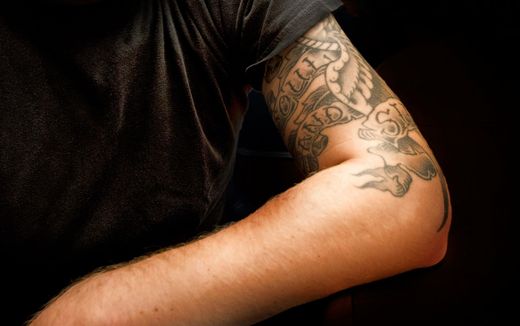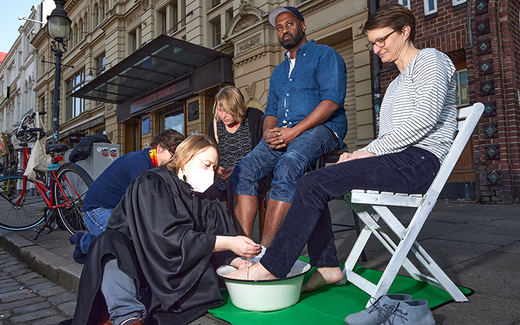Are Christians allowed to wear a tattoo?

Photo Unsplash, Jon Tyson
European Union
Over the past few days, at least three Christian media in several countries have paid attention to tattoos. Whether in Germany, France or the Netherlands, they put one question at the centre: are Christians allowed to wear a tattoo?
Is it a sin? With that question, the French medium Famille Chretienne confronted its readers on Saturday. Tattoos are no longer only for convicts, bikers or sailors. Today, men and women, boys and girls, can get one, too, without feeling embarrassed.
At the same time, tattoos have a rather shady history, Famille Chretienne illustrates. Since Antiquity, cattle and slaves have been tattooed to mark them with their owner's seal. The ancient Egyptians only tattooed their women with erotic symbols as a dedication to the gods of procreation. Often, tattoos were forced on people, such as convicts. In addition, pagan groups have tattooed themselves for a long time, and the images often symbolise belonging to a group or breaking with the home environment.
People use tattoos to express their inner self in their outer appearance, Famille Chretienne writes. "That is why the new tattoo candidate can also be a Catholic girl, who chooses a Jerusalem cross, or the nun of Eastern Christians."
At the same time, the medium questions whether it is necessary to create this link between one's inner soul and one's body. "In reality, the body is already, in a way, the visible face of the soul. Your body is not a foreign contraption to be tamed; your body is you. Your body, your arms, your voice are sufficient to express your sole belonging, your filiation with the living and liberating God, Who, through baptism, left an eternal imprint on your whole person."
Individualism
Tattoos are an expression of pure individualism, the Dutch philosophy professor Marc J. de Vries writes in an opinion article in the Dutch daily Reformatorisch Dagblad. De Vries refers to a survey in which people with tattoos indicated that they were looking for attention and recognition.
Christians often motivate their choice for a tattoo by saying they want to testify of their faith with a Christian symbol on their skin. Opponents often refer to Leviticus 19, which reads that you shall not tattoo yourselves for the dead. Another text they mention is 1 Corinthians 6, which describes the body of a believer as a temple of the Holy Spirit, with which you cannot do everything you please. Yet, these texts refer to a specific context, even though they can be read a bit more generally as well, prof De Vries writes.
He thinks the main problem with tattoos goes deeper than a few Bible texts. The fundamental issue is, according to him, that tattoos are an expression of the spirit of this time, individualism. "I want to be seen, I want to belong, I want to make something clear. That can even take on a Christian form." De Vries argues that it can be questioned whether it is good to evangelise in a way that is questioned in two places in the Bible. "Maybe to be in, but not of this world" requires us to not go along with the trend of tattoos."
Old
The Swiss medium Livenet sees a bit more space for Christians to get a tattoo. "In fact, the custom of Christians getting a tattoo is very old", it argues, thereby contradicting Famille Chretienne, that writes that traditionally, Christians have kept a safe distance from inking their bodies. According to Livenet, Christian women in Bosnia were tattooed to prevent them from converting to Islam. And before that, pilgrims travelling to Jerusalem allegedly got a Christian symbol tattooed on their bodies there too. They did so as proof that they were actually there and also to serve as identification and protection against robbers, Livenet writes. Nowadays, small tattoos of Christian symbols prove that one belongs to the Christian faith for many regions of the world, the Swiss medium states.
Livenet stresses that while Western churches reject tattoos, Eastern Orthodox churches still hold onto the images. The Swiss medium itself is inclined more to the Eastern tradition. It stresses that the texts in the Old Testament that refer to tattoos are time bound and that the New Testament says nothing about the practice. "This means there is practically no biblically based rejection of tattoos." Therefore, Livenet writes that tattoos can be "a statement of one's own faith that is meant and taken seriously."
Testimony
Altogether, these articles show that there is no consensus on the practice of tattoos in the Christian world. Testifying of your faith is, of course, a good thing to do, C.W. Schimmel responds to a question in the Reformatorisch Dagblad. At the same time, the teacher points out that using the body to show faith is not forbidden. "The Bible speaks about clapping the hands and exulting in glory. Yet, this is always connected to the use of the mouth. Getting a tattoo can and may never replace the testimony with the mouth, so we no longer have to speak about our beliefs. Who never talks about his faith, but only wants to testify by means of a Bible text or cross, falls short, Biblically seen."
Related Articles







